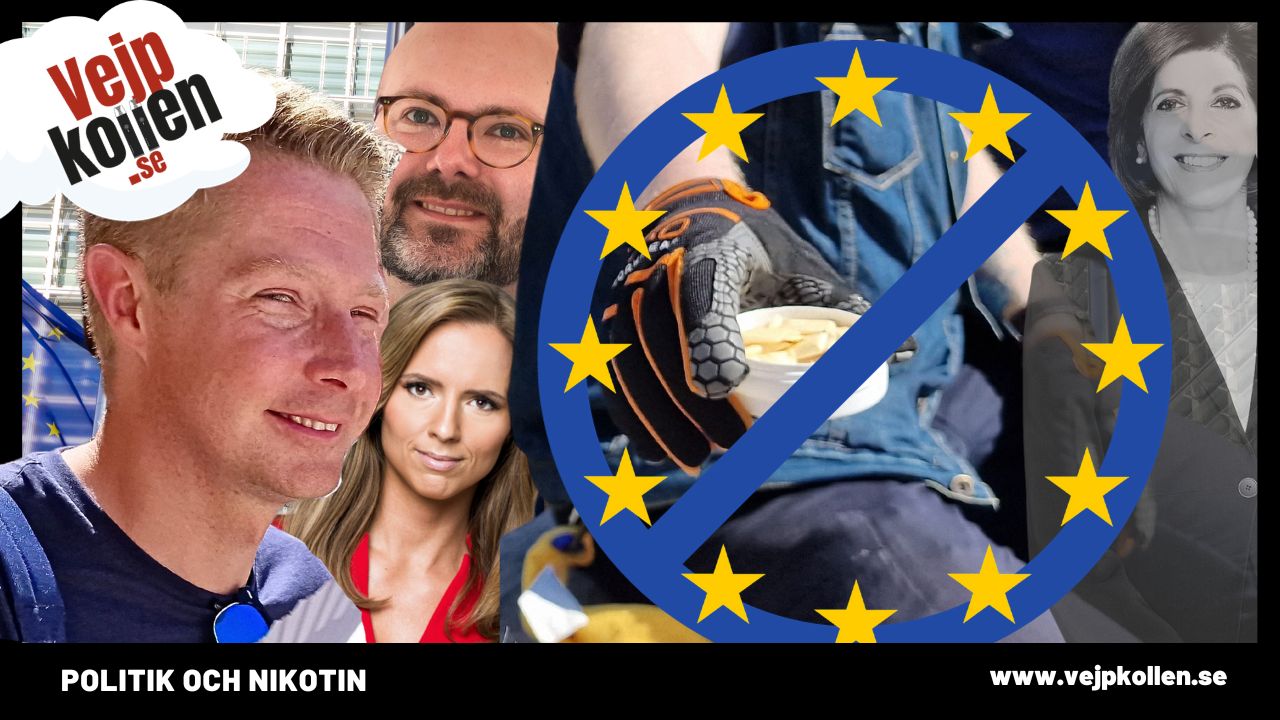The issue of nicotine pouches has been heating up in the EU, with some reports, albeit unconfirmed by official sources, suggesting that the availability of smokeless nicotine products such as white snus may be severely restricted. If the EU Commission gets its way.
"There is an imminent risk that the Commission will come up with a proposal to ban nicotine pouches already in February or March. But there is nothing concrete on the table yet" says MEP Johan Nissinen (SD) to Vejpkollen.
For years, he has promoted harm minimisation, smoke-free nicotine and Swedish snus in Brussels. Aren't there t-shirts and snus boxes with the message "no smoking"? "The EU should give a damn about snus" he shows up with seminars on relative risks with different forms of nicotine use, or ask critical questions to the Commission in the Parliament. Johan Nissinen does not use snus himself, but has many friends who do, he says.
"Most of them to stop smoking, others because they just like it. Some also vejpar, although there are not as many at home in Sweden. For me, this is about saving lives. Sure, these are strong nicotine products, but they actually help a lot of people to stop smoking. That is why I have chosen to pursue this issue", he tells Vejpkollen.
Interest is growing - slowly
Together with Sara Skytterdal (kd) and party colleague Charlie Weimers Johan Nissinen has become a vocal advocate of harm minimisation in the European tobacco policyicing. He wants nicotine pouches and e-cigarettes to be regulated much more lightly than cigarettes. And for the EU to authorise Swedish snus.
"There are not many of us pushing the issue and there is strong opposition to snus, nicotine pouches and vejps. Much of it is due to ignorance, but many consider harm minimisation for smokers to be a rather unimportant issue. At the same time, we have seen some change in attitude from some quarters in the Parliament, although not a majority." says Johan Nissinen.
More smokers in countries without alternatives
Currently, an average of 20 per cent of the adult population in the EU smokes. However, the use of nicotine differs between countries. In the Nordic countries, but also in the former member state of the UK, where the use of alternative, smoke-free nicotine products is increasing the most, the proportion of smokers is significantly lower than in countries where cigarettes are the only alternative for nicotine users. Sweden also has the lowest smoking rate in the EU, at almost 5 per cent of the population, while the use of snus and nicotine pouches is almost 15 per cent.
Fewer people die from nicotine use
The figures come from EUbarometer, which regularly publishes measurements and analyses of smoking and other nicotine use in the EU. In its analysis, EUbarometer attributes snus and other oral nicotine products as the obvious reason for the low smoking rate in Sweden. Additional statistics also show that the proportion of Swedes who die from smoking-related diseases is significantly lower than in other countries.
For Mr Nissinen, this is convincing enough to pursue a political line.
"There is no denying that Swedish snus, and now nicotine pouches, have led to better health for us in Sweden compared to other countries where people smoke more. That makes this a very important issue, in my opinion," he told Vejpkollen.
Sensitive issue in Brussels
According to Mr Nissinen, the Swedish model is the key to reducing the harm caused by smoking in the EU, but it is an idea that has not really caught on in the Parliament.
"Interest has grown, even if it's not huge," he says. "It's a small issue that is still very sensitive in the EU. On one occasion, Parliament invited a professor from Sweden to talk about his research on the risks of nicotine and snus. It was a good interview, but at the same time he was treated very unpleasantly by some MEPs, even though what he was talking about was only very rigid and clear research results. He bluntly said that smokeless nicotine use does not harm the body even close to as much as smoking. Then he was accused of working for the tobacco industry, which is really not true. It was absurd and something that other MEPs also reacted to." says Johan Nissinen.
The EU Commission instead warns
Regardless of reactions from some MEPs, others seem to have at least thought twice about harm minimisation. Voices are being raised in favour of the Commission investigating the possibility of smoke-free nicotine products in the context of new tobacco directives, and according to Sara Skytterdal a majority voted in favour recently cautiously positive to just such an investigation.
At the same time, it is clear that the European Commission, the de facto government of the EU, has an entirely different approach to both nicotine use and harm minimisation.
"The growing popularity of nicotine pouches is a growing public health problem and an increasing challenge to the internal market." recently wrote Stella Kyriakides, EU Commissioner for Health and Food in a statement to the European Parliament. Statement to the European Parliament.
It was an answer to the question of when and how nicotine pouches will be regulated in the future. The questioner, a Nicolás González Casares from the EU's left-wing bloc, argued that nicotine pouches are more addictive than cigarettes, far too tasty and proven to be cheaper than cigarettes. He made demands and Stella Kyriakides emphasised that the regulation of the new nicotine products is at the heart of the ongoing evaluation of the Tobacco Directive. The tobacco directive is due to be revised this year, after a process that was postponed due to the Covid-19 pandemic and the war in Ukraine.
"The aim is to create the 'tobacco-free generation', to better protect the health of citizens, and in particular young people, from the risks posed by tobacco and related products" wrote Mr Perez. Stella Kyriakides.
High risk of ban proposals already this spring
According to persistent rumours over the past year, most recently in the form of an article in the Politico magazine, the Commission will propose a ban on nicotine pouches, based on an as yet unpublished report by an external health organisation. And soon. The ban would be in line with the ban on Swedish snus, which the report describes as "successful".
Johan Nissinen believes that there is a great risk that the proposal will be presented as early as February. And then things could go badly for nicotine pouches in their current form, even in Sweden.
"There would be chaos. Considering how many Swedes use nicotine pouches, most of them to stay smoke-free, it would be devastating. People would be pissed off and we would see even more calls for Brexit. Not good for the EU at all, I would say."
What can consumers do to influence a possible ban proposal?
'Contact Swedish politicians and tell them what you think and what these products mean to you. Swedish politicians can stand up and say no. But they have to be a bit un-Swedish, I usually say. They cannot compromise on this issue. Nicotine pouches mean as much as snus to Swedes, and politicians must realise and channel that. If countries like Finland and Hungary, where nicotine pouches are popular, also speak out, it may be possible to stop this development."
How do you think the European Parliament would react to a ban on nicotine pouches today?
"Right now, things are looking bleak. What we can hope for is that the proposal is not before the Parliament until after the June elections. Today, there is a red/green majority in the Parliament, and that faction is largely opposed to harm minimisation. They would rather see bans and restrictions on smokeless nicotine products than more liberal legislation. However, there might be a different majority after the elections, which would increase the chances of stopping the Commission's supposed proposal," says Mr Nissinen.




